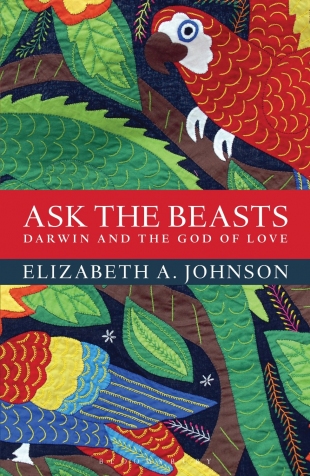Elizabeth Johnson is a Sister of St. Joseph and a Distinguished Professor of Theology at Fordham University. Her book She Who Is has been seen by many as a pioneering work in feminist theology. In Quest for the Living God, Johnson presented an overview of the Christian understanding of the Trinity along with new ideas of God that have arisen from attempts to deal with the darkness of the Holocaust, the struggles of the poor for social justice, and the efforts of women to achieve equal human dignity. In 2011, Johnson came under fire when the doctrinal committee of the U.S. Conference of Catholic Bishops condemned Quest for the Living God for not strictly adhering to official Catholic teaching.
In this erudite and compelling volume, the now controversial author explores the connections between Darwin's account of the origin of the species and the Christian story of the ineffable mercy and love of God recounted in the Nicene Creed. The title comes from the book of Job 12:7: "Ask the beasts and they will teach you." Johnson's quest is to "engender an ecological ethic of love for Earth's community of life."
Two contradictory forces are operating in our culture at this time. One is the growth of a new awareness and appreciation of Earth as a small planet hospitable to life, and the second is the damage we continue to inflict on the environment even though we know the terrible consequences of these selfish and short-sighted actions. At this precipitous moment, devotees of science and religious believers of all stripes can co-operate in a concerted effort to preserve the planet.
Johnson calls Charles Darwin's On the Origin of the Species "one of the most significant books of the modern era, a genuine game-changer in the history of ideas." She commends his exploration and appreciation of the tapestry of life, the beauty of nature, the origin of the species through natural selection, and a deep respect for the evolving community of life. With remarkable clarity, Darwin places biological evolution within the context of cosmic dynamism.
Johnson then notes that the Nicene Creed seems to give credence to the idea that the Creator keeps on sustaining and fiddling with the universe. Continuous creation means that Spirit is moving and improvising new possibilities in the midst of our everyday lives. Through images of water, wind, air, and fire, Wisdom is alive as the wellspring of life. The sons and daughters of God rejoice in this good news and so do the beasts who have long felt that their world is the dwelling place of the Creator.
For a long time the Christian church fathers and theologians have maintained that plants and trees and all members of the animal family will not be redeemed in the glory of the last day. Now there is more support for the idea that all creatures will share in the power of resurrected life for all beings. Or, as Johnson puts it: "There are grounds for thinking that God's charity is indeed broad enough for bears."
The author laments that the human species is speeding up the extinction of vast numbers of other species and the result could be that our legacy has already become "the erasure of others on the tree of life." Johnson is not hopeful that humanity will change its ways anytime soon. But she does believe that those who can expand their repertoire of love through the ecological vocation are on the right path: one that both the Spirit and Charles Darwin would commend.
